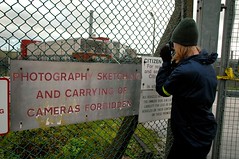
DSC_0630_en
Originally uploaded by Radical_Images
(CNN) -- Yahoo misled Congress regarding information the Internet company gave to Chinese authorities about the journalist Shi Tao, Democratic Rep. Tom Lantos said Tuesday.
Yahoo officials have been asked to testify before a House committee in November about a Chinese journalist's case.
Lantos, a California representative and chairman of the House Foreign Affairs Committee, asked Yahoo Inc. officials to testify about the company's role in a case that sent Chinese newspaper writer and editor Shi to prison on a 10-year sentence.
Lantos asked Yahoo Chief Executive Officer Jerry Yang and Senior Vice President and General Counsel Michael Callahan to appear November 6.
"Our committee has established that Yahoo provided false information to Congress in early 2006," Lantos said in a written statement. "We want to clarify how that happened, and to hold the company to account for its actions both before and after its testimony proved untrue. And we want to examine what steps the company has taken since then to protect the privacy rights of its users in China."
The newspaper reporter had posted information under a pseudonym on an overseas Web site called Democracy Forum about a government crackdown on media and democracy activists, Lantos said.
Shi was later arrested in his home in Beijing after Yahoo gave Chinese authorities information about his e-mail account, his computer address, his log-on history and the contents of several weeks of his e-mail, Lantos said.
Lantos said a Yahoo official testified last year that the company knew nothing "about the nature of the investigation" of Shi, a pro-democracy activist now serving time on what Lantos called "trumped-up charges."
Don't Miss
China puts the squeeze on Web controls
"We have now learned there is much more to the story than Yahoo let on, and a Chinese government document that Yahoo had in their possession at the time of the hearing left little doubt of the government's intentions," said Republican Rep. Chris Smith of New Jersey.
"U.S. companies must hold the line and not work hand in glove with the secret police."
In a written statement, Yahoo spokeswoman Tracy Schmaler said Yahoo representatives have been truthful with Congress. He called the House committee's accusation "grossly unfair" and said it "mischaracterizes the nature and intent of our past testimony."
During a February 2006 subcommittee hearing on limits to freedom on the Internet in China, Lantos and Smith questioned Callahan about Shi.
Callahan testified to the subcommittee that Yahoo handed over the information to Chinese authorities at a time when it knew nothing about the investigation, Lantos said.
But the San Francisco, California-based human-rights group The Dui Hua Foundation released documents in July indicating police in China had written to Yahoo saying they were seeking evidence about Shi for illegally "providing state secrets to foreign entities," a charge frequently levied against political dissidents in China.
"This new documentation suggests that Yahoo's Beijing office was at least aware of the general nature of the crime being investigated in the Shi Tao case," said Joshua Rosenzweig, manager of research and publications for The Dui Hua Foundation.
Even if Yahoo was unaware of the specific circumstances of the Chinese government's inquiry, "One does not have to be an expert in Chinese law to know that 'state secrets' charges have often been used to punish political dissent in China," said Rosenzweig.
Shi has appealed his 10-year sentence for divulging state secrets, saying he did not know the information he shared was classified. He accused the police of using improper procedures in the investigation and arrest.
In addition, he has filed suit in U.S. federal court against Yahoo and its Hong Kong-based subsidiary.
Yahoo's spokeswoman said the company is working with other companies and the human rights community "to develop a global code of conduct for operating in countries around the world, including China."




No comments:
Post a Comment